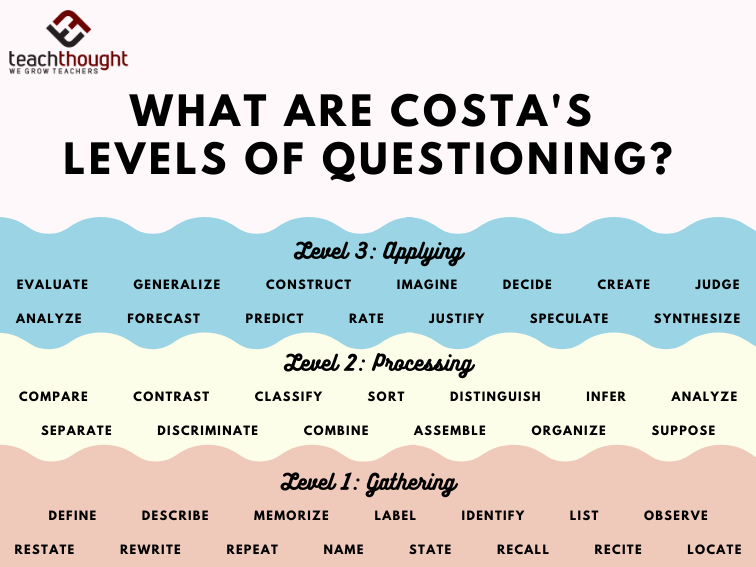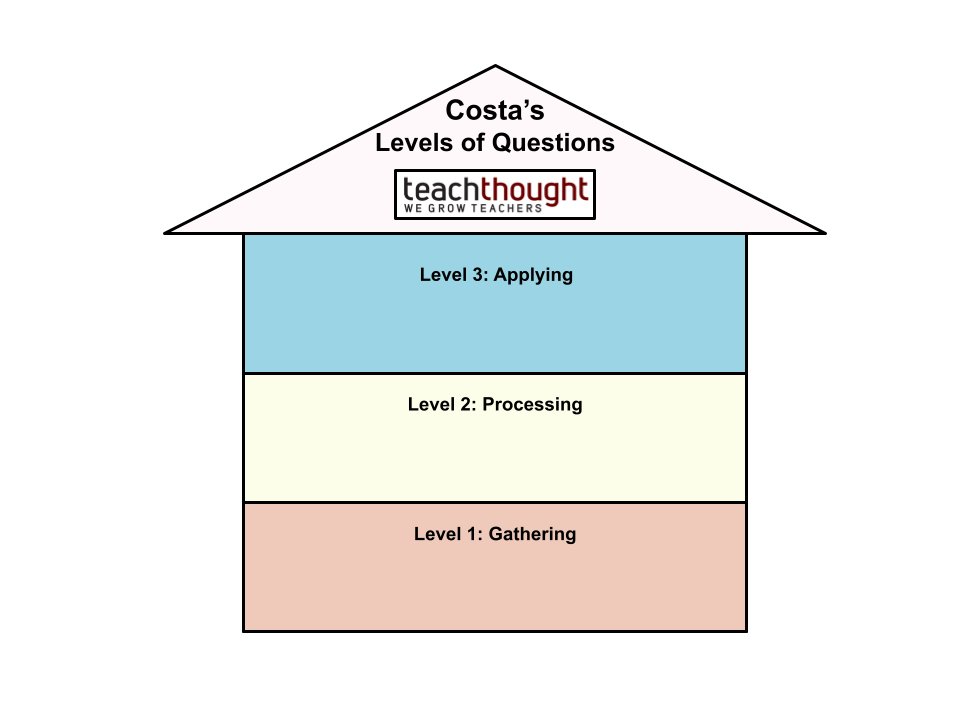

Costa’s Degrees of Questioning– developed by instructional researcher Art Costa– include 3 tiers of examining made to advertise higher-level reasoning and query.
Similar to Bloom’s taxonomy , Costa’s lower level triggers students to make use of more standard faculties; as trainees move up in levels, the questions prompt them to utilize even more complicated thinking abilities. Via years of research study on human durability, Dr. Costa likewise recognized the 16 Behaviors of Mind , a collection of habits that sustain trainees in browsing the difficulties that typically occur in school and life, as a whole. Several of Dr. Costa’s 16 behaviors– believing interdependently, introducing, gathering data, and applying past understanding to new circumstances– both require and enhance higher levels of doubting.
There is a substantive quantity of study that sustains Dr. Costa’s schema. Newmann (1993 found that higher-order assuming compels pupils to “control info and concepts in ways that change their meaning,” and “expects trainees to address troubles and establish indicating on their own,” which straightens with a constructivist sight of education
Costa’s Degrees of Questioning are normally highlighted making use of the allegory of a residence with 3 floors:


Level 1: Gathering
Level 1 questions generally require pupils to deal with info ‘on the page.’ Response to degree 1 inquiries are usually literal; definition, a trainee can essentially indicate the response on a web page.
We’ve formerly written about Bloom’s Taxonomy power verbs , so you can forecast that Costa’s degrees have their own set of power verbs, as well. Right here are a few that you might discover at the beginning of Level 1 questions:
- Specify
- Define
- Remember
- Label
- Recognize
- Checklist
- Observe
- Reiterate
- Revise
- Repeat
- Call
- State
- Remember
- Recite
- Locate
- Select
- Suit
- Program
Level 1 concerns by content area could appear like these examples:
- Science : Label the parts of a pet cell.
- Math : Recite the formula for locating the quantity of a cylinder.
- Social Studies : Match the name of the king to their particular nation.
- English Language Arts : Locate the location in the story where the climax occurs.
You can see exactly how the majority of these Degree 1 power verbs call for students to remember information, which is an important skill in its very own right. Nevertheless, educators ought to strive for the majority of their concerns to drop in Degree 2 or 3, which test students to use higher-order reasoning abilities.
Level 2: Processing
Degree 2 questions go a step even more than Degree 1, triggering pupils to process details by ‘analysis between the lines.’ While pupils might need to make use of literal details to develop their responses, Level 2 requires them to process that details with what they already know in order to make new connections.
Here are some instances of Level 2 power verbs:
- Contrast
- Contrast
- Categorize
- Sort
- Distinguish
- Infer
- Assess
- Different
- Differentiate
- Integrate
- Set up
- Organize
- Intend
Degree 2 questions by material area may show up in the following ways:
- Science : Compare the procedures of mitosis and meiosis.
- Math : Identify the geometric shapes according to their number of sides and angles.
- History : Set up the adhering to historical events in the order of significance, from many to least.
- English Language Arts : Analy ze the effect that the author’s tone carries the total definition of the message.
Can you see how Level 2 inquiries go an action additionally than Degree 1 More than simply spitting up info, learners take it and ‘do something’ with it. They classify, make differences, and compare/contrast it versus an additional component to see just how it impacts the entire. These type of abilities can boost interest and develop a bridge to the inquiries that really create creativity and higher-level thinking.
Degree 3: Applying
While Level 1 inquiries motivate trainees to deal with input, and Degree 2 questions test them to process that input in order to make new connections. Right here, students participate in the highest-level thinking abilities to produce an outcome. This might arise from making assessments and analyses, testing services to various problems, or making predictions.
We’ve included some instances of Level 3 power verbs below:
- Assess
- Generalize
- Build
- Imagine
- Determine
- Produce
- Court
- Examine
- Projection
- If/then
- Forecast
- Rate
- Justify
- Hypothesize
- Manufacture
- Construct
- Assume
Level 3 concerns by content location may resemble the following:
- Scientific research : Based on data from the last decade of hurricane task in the southeast U.S., anticipate how the frequency of typhoon activity will certainly change in the following ten years.
- Mathematics : Rate the likelihood of a presidential candidate winning the political election based upon safeguarding the electoral ballots from the adhering to united state states: Florida, California, Virginia, New York, Illinois.
- Social Studies : Produce a social compact that considers the impacts of globalization and technological development in the 21 st century.
- English Language Arts : Build a debate that safeguards or refutes mandatory worker vaccination policies in the USA.
Whether preparing for discussion-based activities, project-based discovering, or independent questions, instructors need to aim to orient the majority of pupil reasoning and involvement at Degrees 2 and 3 Assessments that motivate pupils to remember basic truths (such as the date of a historic occasion, or the name of an author, or the formula for an equation) do not actually evaluate pupils’ capability to use brand-new abilities or info to new contexts. A Degree 2 or 3 inquiry would test trainees to make connections with fundamental details. For example, rather than recalling a simple date, an extra flexible question would ask pupils to anticipate, based upon the moment in background that a specific occasion happened, the chance of it recurring, offered a similar sociopolitical ambience. Along the very same lines, rather than recalling the names of renowned writers, an educator might challenge trainees to make an argument for just how a writer would certainly blog about a specific modern-day issue.
In “A Speak with Teachers,” James Baldwin described the mystery of education and learning: “As one begins to come to be conscious, one starts to examine the culture in which [they] are educated.” Degree 2 (and generally, degree 3 questions intend to promote this type of reaction in students, to trigger them to tilt their heads, do double-takes, explain disparities, interfere with the status, determine imperfections in present organizations, and produce cutting-edge remedies for those imperfections. These are the inquiries that inspire us to come up with even more questions, to think of our thinking, and to evolve– both as individuals and societies.